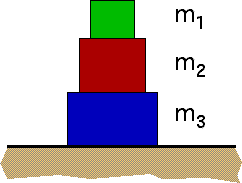A2L Item 043
- Description: Specifying the number of forces on a block in a stack.
- Goal: Identifying and classifying forces.
- Source: UMPERG
- Keywords: Forces, Interactions, Mechanics
The question for students:
Three blocks are stacked as shown below.

How many forces are acting on the bottom block (m3)?
- One force
- Two forces
- Three forces
- Four forces
- Five forces
- Six forces
- More than six forces
- No forces act on the block
- Cannot be determined
Commentary for teachers:
Answer
(3); The gravitational force exerted by the earth, the normal force exerted by the horizontal surface, and the normal force exerted by the block with mass m2.
Background
Some students have difficulty distinguishing between direct and indirect interactions. Students may take the view that m1 directly exerts a force on m3. This view is often verbalized as “the weight of block m1 is exerted on m3.”
It is helpful to classify forces into action-at-a-distance forces, such as gravity and electromagnetism, and contact forces. Students can then employ a strategy for identifying all the forces since every object touching a body will give rise to a force. The only exceptions are the fundamental forces, which is an easily exhausted list.
Questions to Reveal Student Reasoning
Does m3 exert a force on m1?
What part of m2 interacts with m3? What part of m1 interacts with m3?
Is weight a force? If so, what object exerts the force?
Can an object interact with another object without touching it? If so, when? If not, why not?
Is the normal force exerted by m2 on m3 less than, equal to, or greater than the weight of m2?
Suggestions
If one pushes on both sides of a bathroom scale the scale reading will change. What does the scale measure. How is the reading related to the forces exerted on the scale?
If bathroom scales are placed between the blocks, what forces would each scale measure (assuming that the scales themselves have very little mass compared to the mass of the blocks)?